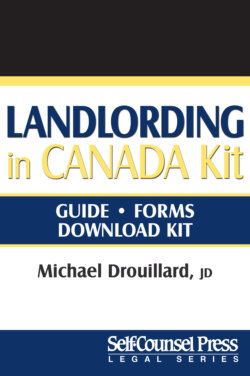Читать книгу Landlording in Canada - Michael Drouillard - Страница 32
На сайте Литреса книга снята с продажи.
ОглавлениеChapter 5
INSURANCE
In this chapter, you will learn to:
• Obtain adequate liability insurance for your property; ensure your policy covers all liabilities before you rent it out.
• Advise a potential tenant to purchase rental insurance upon moving into your property. Make it a term of the rental agreement that he or she does so.
• Prohibit items that have the potential to cause serious property damage (such as a barbeque, aquarium, or waterbed) unless rental insurance is obtained. Make this a term in your rental agreement.
• Never mislead an insurer about the use or intended use of property; doing so will invalidate any future insurance claim.
Types of Insurance
It’s critical that you check to see if you are exposed to liabilities not covered by your standard homeowner’s insurance policy when you rent out property, including your secondary suites.
The need for insurance is shared between the landlord and tenant. You insure the interior finishing (kitchen cabinetry, flooring, etc.) against damage by fire or flood, for instance, while it is the tenant’s responsibility to purchase a rental insurance policy that protects personal possessions. Many tenants mistakenly believe it is a simple matter of claiming against the landlord if their possessions are lost or damaged due to fire or water damage, theft, etc.
At the time of application, the tenant should be told to purchase rental insurance. Understandably, many landlords are uncomfortable accepting an applicant who is unwilling to purchase insurance for his or her own possessions. In particular, your tenant should be prohibited from using barbeques, aquariums, water beds or any other items that have potential to cause serious property damage unless rental insurance is obtained. Make this a term in your rental agreement.
Liability Insurance
Even before you advertise your property for rent, you must obtain adequate liability insurance for the property. Companies recommended by your landlord association will have the experience with rental property that you need.
The agent should be willing to spend time researching the right plan for you. If you only have a few properties, your insurance agent may set up a plan as an extension of your own home insurance package. This is cost effective and less complex than separate insurance plans designed for medium and large real estate operations.
Ethical landlording tip: Never mislead an insurer about the use or intended use of a property. Your insurance company must be made aware if your home contains a secondary suite, for instance. Any short-term benefit of lower insurance premiums will be obliterated if a claim is filed and the insurance company finds out (and it will find out) it has been misled about the use of the property. In fact, lying to an insurer could lead to a homeowner’s savings being wiped out.
We all want to save money. In the landlording business, the best way to save money is to select good tenants in the first place. Effective tenant screening should be your primary concern.
